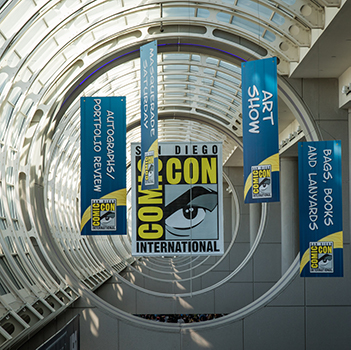Naming Conventions: According to the Ninth Circuit, Not Every Comic Convention Is a “Comic-Con”

Even devoted comic book fans and other true believers might not know that the term “Comic-Con” is meant to refer to the king of comic conventions—the San Diego Comic Convention (“SDCC”)—not all comic conventions in general. Until now! In the recent San Diego Comic Convention v. Dan Farr Prods., No. 18-56221 (9th Cir. April 20, 2020) decision, the Ninth Circuit established that the last two syllables of “convention” are crucial for organizers who want to avoid being illustrated as the bad guy in a trademark dispute, even if those syllables make a convention’s title slightly longer and less snappy. The Court affirmed a district court’s holding that the defendant, Dan Farr Productions, failed to prove that “Comic-Con” is generic, and it also affirmed that SDCC did not exercise unclean hands in registering “Comic-Con” as a trademark. In addition, the Ninth Circuit affirmed the district court’s award of attorney fees against Dan Farr Productions for its infringing use of the term for the Salt Lake Comic Con.
The Ninth circuit ruled that the district court properly granted summary judgment when it concluded that Dan Farr Productions’ evidence was insufficient to support its claim that the term “Comic-Con” was generic prior to SDCC’s first use.
The district court denied Dan Farr Productions’ motion for summary judgment on its “generic ab initio” defense. Dan Farr Productions argued that “Comic-Con” was generic before SDCC used the wording as a trademark to the products at issue. The court denied this argument, and granted SDCC’s motion for summary judgment. The district court stated in its opinion that the Ninth Circuit has never recognized a “genericness ab initio” theory of defense, finding the argument irrelevant. Moreover, the court concluded that even if such a theory were available, Dan Farr Productions’ evidence was insufficient to support the argument that the term “Comic-Con” was generic prior to SDCC’s first use. As the record before the district court failed to demonstrate any genuine issue of material fact, the Ninth Circuit affirmed the district court’s grant of summary judgment in favor of SDCC.
 Fortunately for SDCC, the Ninth Circuit also found that district court did not abuse its discretion in denying Dan Farr Productions’ motion for judgment on the unclean hands defense. To show that SDCC had “unclean hands,” Dan Farr Productions was required to demonstrate SDCC’s super villain-like behavior, specifically, wrongfulness, willfulness, bad faith, or gross negligence. Such behavior must be proven by a standard of clear and convincing evidence. Dan Farr Productions claimed that SDCC had unclean hands by registering its various Comic-Con trademarks. The Ninth Circuit affirmed the district court’s denial of Dan Farr Productions’ motion for judgment on the unclean hands defense. According to the Ninth Circuit, Dan Farr Productions failed to prove on appeal that the district court abused its discretion by finding no evidence of unclean hands in SDCC’s registration of the contested marks.
Fortunately for SDCC, the Ninth Circuit also found that district court did not abuse its discretion in denying Dan Farr Productions’ motion for judgment on the unclean hands defense. To show that SDCC had “unclean hands,” Dan Farr Productions was required to demonstrate SDCC’s super villain-like behavior, specifically, wrongfulness, willfulness, bad faith, or gross negligence. Such behavior must be proven by a standard of clear and convincing evidence. Dan Farr Productions claimed that SDCC had unclean hands by registering its various Comic-Con trademarks. The Ninth Circuit affirmed the district court’s denial of Dan Farr Productions’ motion for judgment on the unclean hands defense. According to the Ninth Circuit, Dan Farr Productions failed to prove on appeal that the district court abused its discretion by finding no evidence of unclean hands in SDCC’s registration of the contested marks.
The Ninth Circuit affirmed the district court’s award of reasonable attorney fees to SDCC but vacated its award of non-taxable costs for expert witnesses. The Ninth Circuit explained that the Lanham Act authorizes district courts to award “reasonable attorney fees” for “exceptional cases” based on examining the “totality of the circumstances” and using a preponderance of the evidence standard. In doing so, district courts may consider a variety of nonexclusive factors, including objective unreasonableness, compensation, and deterrence, which were the factors on which the district court focused.
According to the district court, Dan Farr Productions litigated its case in an “unreasonable manner.” This included such Joker-like behavior as their “failure to comply with court rules, persistent desire to re-litigate issues already decided, advocacy that veered into ‘gamesmanship,’ and unreasonable responses to the litigation.” In other words, Dan Farr Productions’ conduct had crossed the line from common villainy to super villainy. To compensate SDCC and deter future infringers, the district court decided that it was therefore necessary to deem the case “exceptional” and award reasonable attorney fees. The Ninth Circuit concluded that this was not an abuse of discretion. However, since the district court’s award of non-taxable costs for expert witnesses was not expressly authorized by the Lanham Act, the Ninth Circuit vacated that part of the award.
Unless comic book fans care about Ninth Circuit trademark law as much as they care about collecting the latest issues of The Super Friends, The Unbeatable Squirrel Girl, and Betty and Veronica, there is a good chance that fans will still refer to all conventions as “Comic-Cons.” However, organizers who want to avoid a lawsuit should be mindful about how they name their conventions. Even so, like many current comics, the lessons provided by this decision are not simply black and white. There is also a lot of gray. In the end, Dan Farr Productions wasn’t SDCC’s nemesis because they failed to sufficiently prove that “Comic-Con” is generic, but that doesn’t mean it can’t be done. A different defendant with different counsel litigating their case in a more reasonable manner might become SDCC’s kryptonite if they can provide sufficient evidence to meet their burden. ‘Nuff said.







